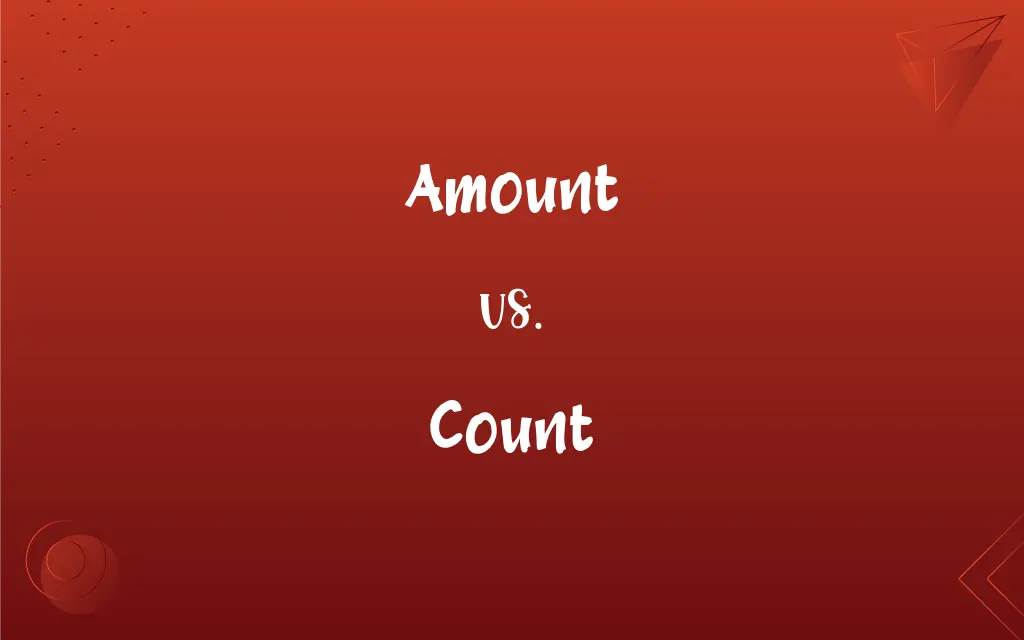Amount vs. Count: What's the Difference?
Edited by Aimie Carlson || By Janet White || Updated on October 10, 2023
"Amount" refers to a total of something, usually uncountable, while "Count" refers to the act of determining the number of items in a set.

Key Differences
The term "Amount" typically alludes to the total of something, especially in contexts where the thing being referred to is uncountable. For example, you'd refer to an amount of water, sugar, or happiness. "Count", on the other hand, pertains to the act of determining or stating the number of items or units in a set. For instance, you'd count the number of apples in a basket or the days until a special event.
Furthermore, "Amount" is often employed when discussing quantities that don't have distinct, separate units. You wouldn't naturally discuss the "amount of chairs" in a room; instead, you'd refer to the "number of chairs." Conversely, "Count" emphasizes individual units. It's about identifying each separate entity and tallying them up.
In mathematics and statistics, the distinction remains clear. "Amount" could refer to a sum or aggregate, while "Count" would indicate the number of data points or observations. For example, in a dataset, you might count the number of data entries and then analyze the amount of a particular variable.
In a financial context, you might hear both terms, but their applications are distinct. "Amount" often refers to a sum of money or a quantity of a resource. You might discuss the amount of money in a bank account or the amount of investment needed for a project. On the other hand, "Count" could be used to discuss the number of transactions, the count of bills in a stack, or the number of financial entries in a ledger.
Comparison Chart
Definition
A total of something, typically uncountable.
The act of determining the number of items in a set.
ADVERTISEMENT
Usage in Language
Refers to quantities without distinct units.
Refers to individual, separate entities.
Mathematical Context
Relates to sums or aggregates.
Pertains to the number of data points.
Context in Measurement
Usually used for uncountable substances.
Used for counting distinct, countable items.
Financial Context
Refers to sums of money or resources.
Refers to the number of transactions or entries.
Amount and Count Definitions
Amount
The total of something uncountable.
The amount of love she felt was immeasurable.
ADVERTISEMENT
Count
To determine the number of items in a set.
She counted the candies in the jar.
Amount
The total of two or more quantities; the aggregate.
Count
A specific numerical value.
The count of attendees was higher than expected.
Amount
A number; a sum.
Count
An official charge or accusation.
He was indicted on three counts of fraud.
Amount
A principal plus its interest, as in a loan.
Count
The rhythm or beat in music or dance.
Keep the count while dancing to maintain rhythm.
Amount
The full effect or meaning; import.
Count
To name or list (the units of a group or collection) one by one in order to determine a total; number.
Amount
Quantity
A great amount of intelligence.
Count
To recite numerals in ascending order up to and including
Count three before firing.
Amount
To add up in number or quantity
The purchases amounted to 50 dollars.
Count
To include in a reckoning; take account of
Ten dogs, counting the puppies.
Amount
To add up in import or effect
That plan will never amount to anything.
Count
To include by or as if by counting
Count me in.
Amount
To be equivalent or tantamount
Accusations that amount to an indictment.
Count
To exclude by or as if by counting
Count me out.
Amount
The total, aggregate or sum of material not applicable to discrete numbers or units or items in standard English.
The amount of atmospheric pollution threatens a health crisis.
Count
To believe or consider to be; deem
Count yourself lucky.
Amount
A quantity or volume.
Pour a small amount of water into the dish.
The dogs need different amounts of food.
Count
To recite or list numbers in order or enumerate items by units or groups
Counted by tens.
Amount
The number (the sum) of elements in a set.
Count
To have importance
You really count with me.
Amount
To total or evaluate.
It amounts to three dollars and change.
Count
To have a specified importance or value
Their opinions count for little. Each basket counts for two points.
Amount
To be the same as or equivalent to.
He was a pretty good student, but never amounted to much professionally.
His response amounted to gross insubordination
Count
(Music) To keep time by counting beats.
Amount
To go up; to ascend.
Count
The act of counting or calculating.
Amount
To go up; to ascend.
So up he rose, and thence amounted straight.
Count
A number reached by counting.
Amount
To rise or reach by an accumulation of particular sums or quantities; to come (to) in the aggregate or whole; - with to or unto.
Count
The totality of specific items in a particular sample
A white blood cell count.
Amount
To rise, reach, or extend in effect, substance, or influence; to be equivalent; to come practically (to); as, the testimony amounts to very little.
Count
(Law) Any of the separate and distinct charges or causes of action in an indictment or complaint.
Amount
To signify; to amount to.
Count
(Sports) The counting from one to ten seconds, during which time a boxer who has been knocked down must rise or be declared the loser.
Amount
The sum total of two or more sums or quantities; the aggregate; the whole quantity; a totality; as, the amount of 7 and 9 is 16; the amount of a bill; the amount of this year's revenue.
Count
(Baseball) The number of balls and strikes that an umpire has called against a batter.
Amount
The effect, substance, value, significance, or result; the sum; as, the amount of the testimony is this.
The whole amount of that enormous fame.
Count
A nobleman in some European countries.
Amount
How much of something is available;
An adequate amount of food for four people
Count
Used as a title for such a nobleman.
Amount
A quantity of money;
He borrowed a large sum
The amount he had in cash was insufficient
Count
(intransitive) To recite numbers in sequence.
Amount
How much there is of something that you can quantify
Count
(transitive) To determine the number of (objects in a group).
Count the number of apples in the bag and write down the number on the spreadsheet.
Amount
A quantity obtained by addition
Count
(intransitive) To amount to, to number in total.
Amount
Be tantamount or equivalent to;
Her action amounted to a rebellion
Count
(intransitive) To be of significance; to matter.
Your views don’t count here.
It does count if you cheat with someone when you’re drunk.
Amount
Add up in number or quantity;
The bills amounted to $2,000
The bill came to $2,000
Count
(intransitive) To be an example of something: often followed by as and an indefinite noun.
Apples count as a type of fruit.
Amount
Develop into;
This idea will never amount to anything
Nothing came of his grandiose plans
Count
(transitive) To consider something as an example of something or as having some quality; to account, to regard as.
He counts himself a hero after saving the cat from the river.
I count you as more than a friend.
Amount
A quantity of something.
The amount of sugar in this recipe seems excessive.
Count
(transitive) To reckon in, to include in consideration.
They walked for three days, not counting the time spent resting.
Amount
A sum of money.
The amount in my savings account has grown.
Count
To take account or note (of), to care (for).
Amount
The degree or extent of something.
The amount of effort he puts into his work is commendable.
Count
To recount, to tell.
Amount
The outcome or result of something.
All our discussions amounted to no concrete decision.
Count
To plead orally; to argue a matter in court; to recite a count.
Count
The act of counting or tallying a quantity.
Give the chairs a quick count to check if we have enough.
Count
The result of a tally that reveals the number of items in a set; a quantity counted.
Count
A countdown.
Count
(legal) A charge of misconduct brought in a legal proceeding.
Count
(baseball) The number of balls and strikes, respectively, on a batter's in-progress plate appearance.
He has a 3–2 count with the bases loaded.
Count
(obsolete) An object of interest or account; value; estimation.
Count
The male ruler of a county.
Count
A nobleman holding a rank intermediate between dukes and barons.
Count
(entomology) Any of various nymphalid butterflies of the genus Tanaecia. Other butterflies in this genus are called earls and viscounts.
Count
Countable.
Count
To tell or name one by one, or by groups, for the purpose of ascertaining the whole number of units in a collection; to number; to enumerate; to compute; to reckon.
Who can count the dust of Jacob?
In a journey of forty miles, Avaux counted only three miserable cabins.
Count
To place to an account; to ascribe or impute; to consider or esteem as belonging.
Abracham believed God, and it was counted unto him for righteousness.
Count
To esteem; to account; to reckon; to think, judge, or consider.
I count myself in nothing else so happyAs in a soul remembering my good friends.
Count
To number or be counted; to possess value or carry weight; hence, to increase or add to the strength or influence of some party or interest; as, every vote counts; accidents count for nothing.
This excellent man . . . counted among the best and wisest of English statesmen.
Count
To reckon; to rely; to depend; - with on or upon.
He was brewer to the palace; and it was apprehended that the government counted on his voice.
I think it a great error to count upon the genius of a nation as a standing argument in all ages.
Count
To take account or note; - with
Count
To plead orally; to argue a matter in court; to recite a count.
Count
The act of numbering; reckoning; also, the number ascertained by counting.
Of blessed saints for to increase the count.
By this count, I shall be much in years.
Count
An object of interest or account; value; estimation.
Count
A formal statement of the plaintiff's case in court; in a more technical and correct sense, a particular allegation or charge in a declaration or indictment, separately setting forth the cause of action or prosecution.
Count
A nobleman on the continent of Europe, equal in rank to an English earl.
Count
The total number counted;
A blood count
Count
The act of counting;
The counting continued for several hours
Count
A nobleman (in various countries) having rank equal to a British earl
Count
Determine the number or amount of;
Can you count the books on your shelf?
Count your change
Count
Have weight; have import, carry weight;
It does not matter much
Count
Show consideration for; take into account;
You must consider her age
The judge considered the offender's youth and was lenient
Count
Name or recite the numbers;
The toddler could count to 100
Count
Put into a group;
The academy counts several Nobel Prize winners among its members
Count
Include as if by counting;
I can count my colleagues in the opposition
Count
Have faith or confidence in;
You can count on me to help you any time
Look to your friends for support
You can bet on that!
Depend on your family in times of crisis
Count
Take account of;
You have to reckon with our opponents
Count on the monsoon
Count
To regard or consider in a specific way.
Every opinion counts in this discussion.
FAQs
What does it mean to "lose count"?
To "lose count" means to forget or be unsure of a number when counting.
Can "amount" refer to countable items?
Typically, "amount" is used for uncountable quantities, while "count" is for countable items.
Can "amount" refer to money?
Yes, "amount" can refer to a sum of money.
Is "amount" used in mathematical operations?
Yes, "amount" can refer to sums or aggregates in mathematics.
How does "count" relate to music?
In music, "count" refers to the rhythm or beat.
Can "count" refer to a category or type?
Not usually. "Count" typically refers to a number or the act of counting.
Does "count" always relate to numbers?
Mostly, but "count" can also mean to regard or consider in certain contexts.
How does "amount" differ from "number"?
"Amount" is used for uncountable quantities, while "number" is for countable items, similar to "count."
Can "count" be used in expressions?
Yes, expressions like "count on someone" mean to rely on them.
How does "count" relate to legal contexts?
In legal terms, a "count" can refer to an official charge or accusation.
Can "count" refer to importance or relevance?
Yes, in phrases like "every vote counts," it indicates relevance or significance.
How is "amount" used in financial contexts?
"Amount" often refers to sums of money or quantities of a resource.
Can "amount" indicate a level or degree of something?
Yes, "amount" can indicate the degree or extent of something.
Is "amount" a noun or a verb?
"Amount" can be both, e.g., "a certain amount" (noun) and "to amount to something" (verb).
Does "amount" have a plural form?
No, "amount" is typically used as a singular noun.
About Author
Written by
Janet WhiteJanet White has been an esteemed writer and blogger for Difference Wiki. Holding a Master's degree in Science and Medical Journalism from the prestigious Boston University, she has consistently demonstrated her expertise and passion for her field. When she's not immersed in her work, Janet relishes her time exercising, delving into a good book, and cherishing moments with friends and family.
Edited by
Aimie CarlsonAimie Carlson, holding a master's degree in English literature, is a fervent English language enthusiast. She lends her writing talents to Difference Wiki, a prominent website that specializes in comparisons, offering readers insightful analyses that both captivate and inform.































































